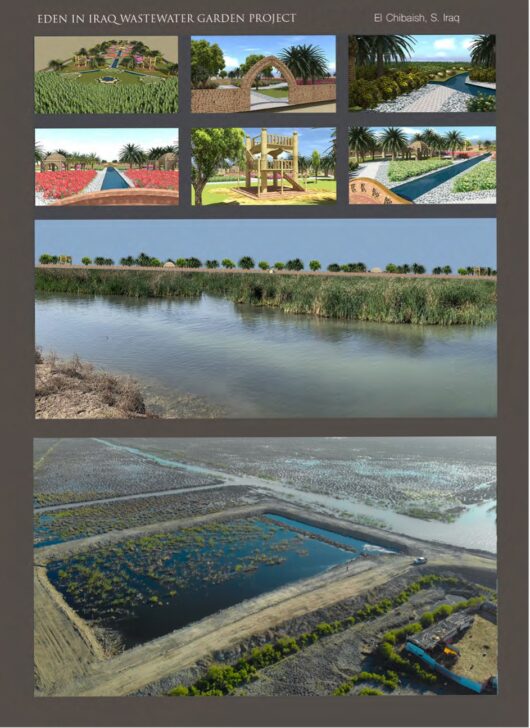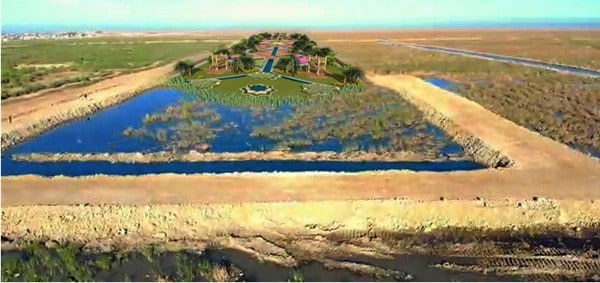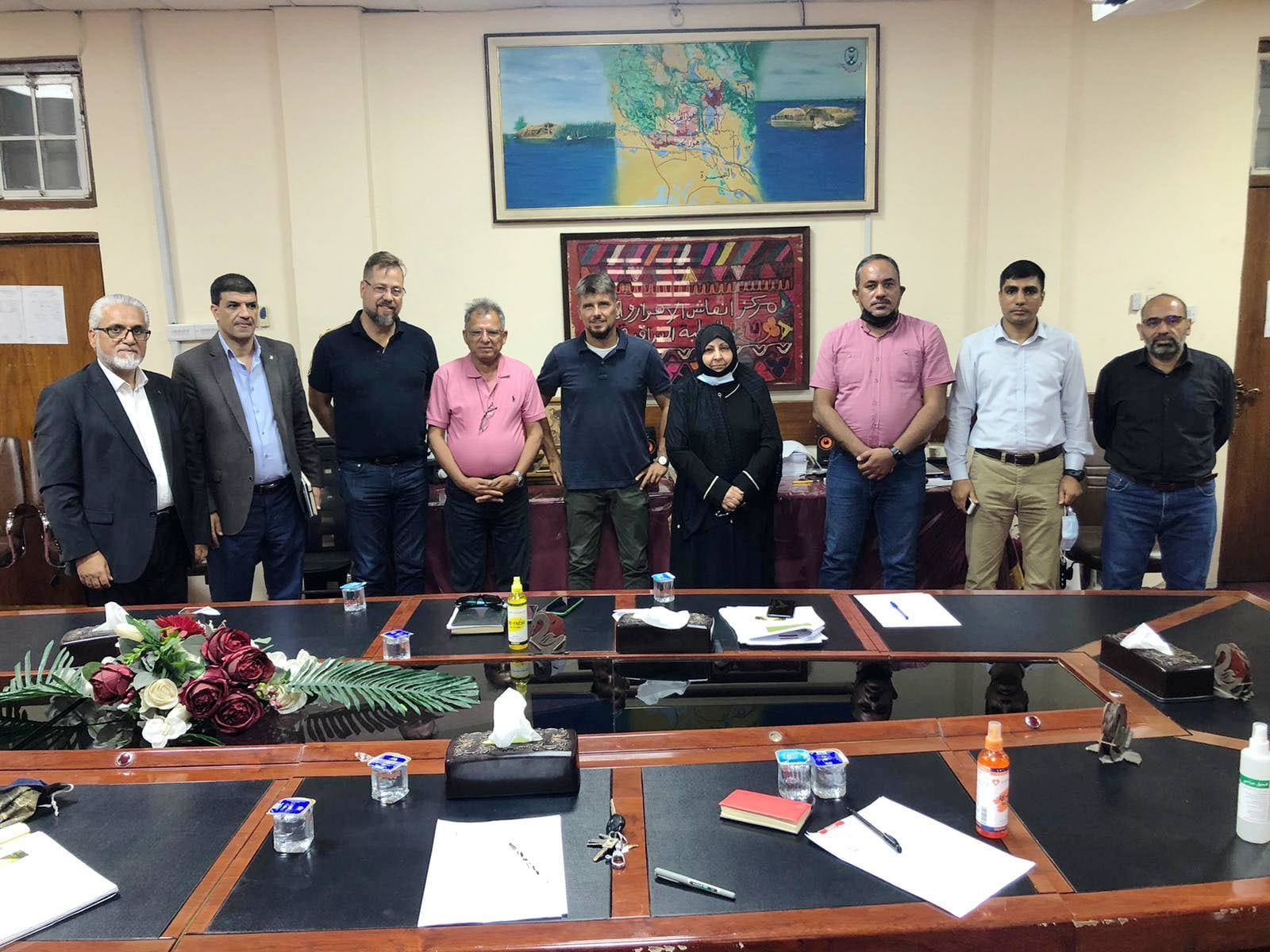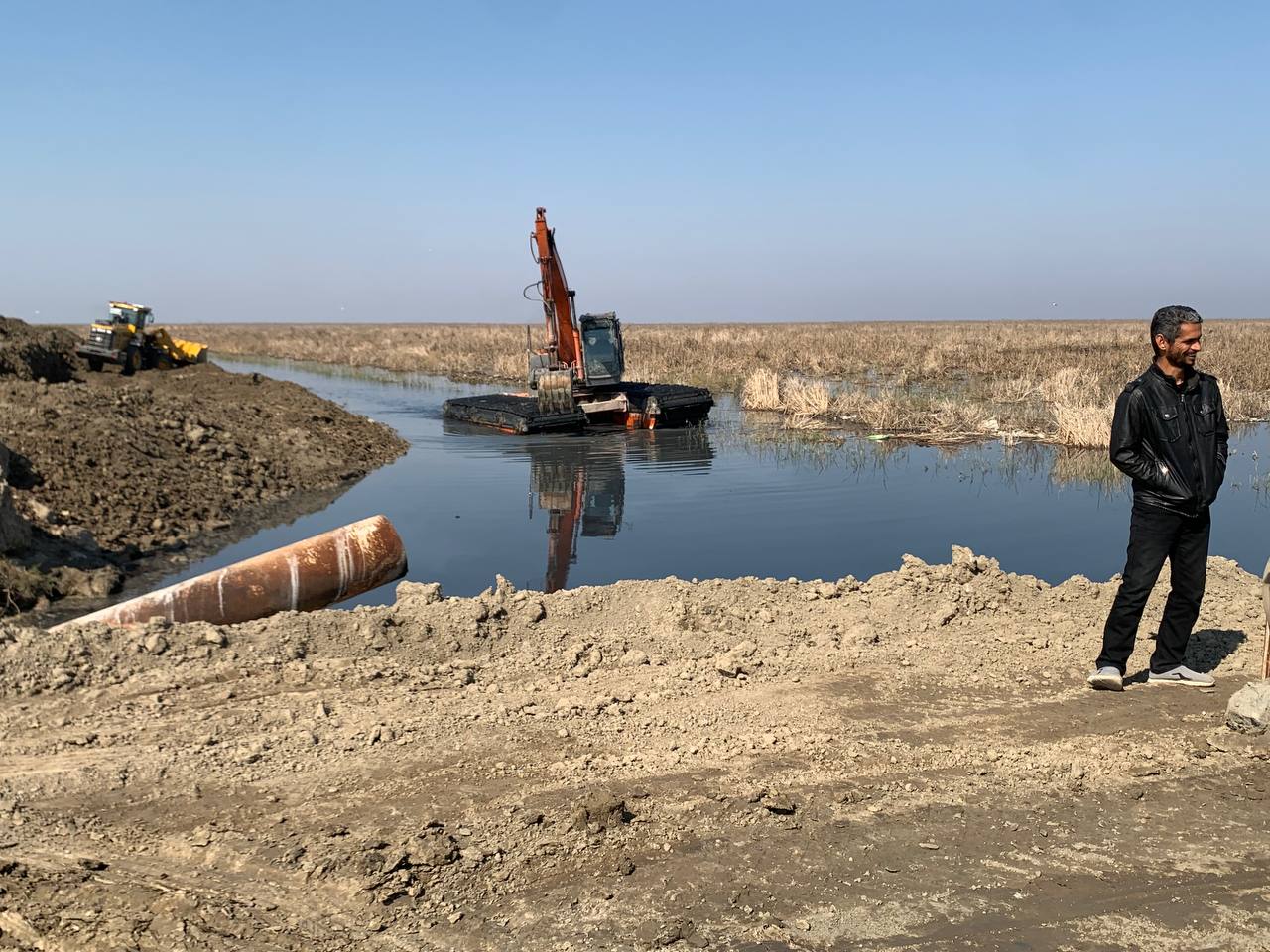
Ecological Wastewater Treatment System in Mesopotamian Marshes of Southern Iraq receives Funding from the Iraqi Ministry of Water Resources and First Phase Nears Completion
The Institute of Ecotechnics and Nature Iraq, NGO, are pleased to announce that construction has begun of its “Eden in Iraq” ecological water remediation project in the Mesopotamian marshes in the south of the country. The Wastewater Garden Project is a humanitarian effort to provide urgently needed clean water for a city of 7000 residents. The Garden will demonstrate how using constructed wetlands and the power of nature to do the job to treat human sewage, and upgrade the ecology in this desiccated region.
With the support of the Iraqi Ministry of Water Resources, work on the first 10,000 square meter (2.5 acres) phase is nearly complete. The full project encompasses 29,500 sq. meter (7.3 acres). Water Resources H.E. Minister Aun Thiab Abdullah authorized machinery, engineering oversight and work required to realize the first phase of the treatment system. The minister said “The Ministry strongly supports the Eden in Iraq Wastewater Project …we strongly encourage the provision of financial support to complete the remaining stages of the project which will end the unfortunate situation of the direct discharge of sewage which affects the marsh ecosystem and the health of the local people.”

This accomplishment is largely due to our team member Jassim al-Asadi’s strong advocacy as the Managing Director of Nature Iraq, the country’s first environmental NGO, and the project’s in-country partner. His prominence as the leading advocate for the restoration and protection of the historic Southern Iraqi marshes has been highlighted by recent international news reports.
Overseeing engineering and construction is Dr. Hydar Ali, the head of planning for the Centre for Restoration of the Iraqi Marshlands and Wetlands (CRIMW) in the Ministry of Water Resources and Project Manager for Eden in Iraq.
ABOUT EDEN IN IRAQ
A project of artist Prof. Meridel Rubenstein, environmental engineers Dr. Mark Nelson and Dr. Davide Tocchetto, and engineer Jassim Al-Asadi, Managing Director, Nature Iraq (NGO). Sponsored by: Nature Iraq (NGO), S. Iraq and Kurdistan and the Institute of Ecotechnics, USA and UK.
The Wastewater Garden Project is a humanitarian water remediation project, expressed through wastewater, garden design and environmental art, providing environmental and cultural regeneration to a desiccated region. The Garden will provide urgently needed health and clean water for southern Iraqis, their children, and future generations to come.
We offer a solution to prevent water contamination through the utilization of simple and sustainable wastewater recycling phyto-technology to support a garden that embodies the rich cultural heritage and tradition of the marshes and the Marsh Arab community, and provides a model for healthy recycled water for the region.
The Wastewater Garden features locally significant design details and will engage with local craftspeople, using local materials, and ancient crafts e.g. reed structures, earthen (adobe) brick, ancient cylinder seal patterns for ceramic tiles, and a floral design layout that is inspired by Mesopotamian embroidered wedding blanket patterns. Treated water will be reused to irrigate beautiful shrubs and fruit trees, creating a beautiful public garden/park.
This first demonstration Wastewater Garden will create a green space that can be scaled up and down throughout Iraq and the region, where adequate sustainable sewage control is lacking. It will be a hub for a community-centric culture to continue to manifest, allowing for local trade and green cottage industries to bolster the regional economy. In addition, this nature-based solution will help to mitigate climate change by providing additional green areas for carbon sequestration.
For more information contact one of the project directors below.
Iraq: Dr. Hydar Ali
hydra_e@yahoo.com
Nature Iraq (NGO)
Pak City Apartments
Block A2, Floor 1, Flat No. 8
Sulimaniyah, Iraq
USA: Meridel Rubenstein
meridel@nets.com
Institute of Ecotechnics
1 Blue Bird Ct
Santa Fe, NM 87508
USA
To make a tax deductible donation in support of this project, see our fundraising campaign linked below.
[/et_pb_text][/et_pb_column][/et_pb_row][et_pb_row use_custom_gutter=”on” gutter_width=”1″ _builder_version=”4.21.0″ _module_preset=”default” background_enable_color=”off” use_background_color_gradient=”on” background_color_gradient_type=”elliptical” background_color_gradient_direction_radial=”top” background_color_gradient_stops=”rgba(95,174,226,0.42) 0%|rgba(232,240,255,0.72) 81%|#0e84f9 100%” background_enable_pattern_style=”on” background_pattern_style=”scallops” background_pattern_color=”rgba(255,255,255,0.25)” z_index=”164″ max_width=”1200px” overflow-x=”visible” overflow-y=”visible” custom_margin=”52px||||false|false” custom_padding=”||||false|false” hover_enabled=”0″ border_radii=”on|36px|36px|36px|36px” box_shadow_style=”preset3″ global_module=”29644″ global_colors_info=”{}” sticky_enabled=”0″][et_pb_column type=”4_4″ _builder_version=”4.16″ _module_preset=”default” global_colors_info=”{}”][et_pb_image src=”https://staging.ecotechnics.edu/wp-content/uploads/2022/04/2.-Meridel-Rubenstein-Adam-and-Eve-in-the-Iraq-Marshes-Near-the-historic-Site-of-th-Garden-of-Eden-2011.jpg” title_text=”2. Meridel Rubenstein, Adam and Eve in the Iraq Marshes, Near the historic Site of th Garden of Eden 2011″ _builder_version=”4.19.5″ _module_preset=”default” max_width=”52%” max_width_tablet=”52%” max_width_phone=”100%” max_width_last_edited=”on|desktop” module_alignment=”center” custom_margin=”-54px||||false|false” custom_padding=”|24px||24px|false|true” border_radii=”on|50%|50%|50%|50%” box_shadow_style=”preset3″ box_shadow_vertical=”24px” box_shadow_blur=”26px” box_shadow_spread=”-8px” box_shadow_color=”rgba(104,145,216,0.44)” global_colors_info=”{}”][/et_pb_image][et_pb_text _builder_version=”4.21.0″ _module_preset=”default” text_text_color=”#3d2517″ header_2_font=”|||||on|||” header_2_text_align=”center” header_2_text_color=”#0b4fbc” header_2_font_size=”36px” header_3_text_align=”center” header_3_text_color=”#0C71C3″ header_3_font_size=”24px” header_3_line_height=”1.5em” header_4_text_color=”#0C71C3″ header_4_font_size=”20px” header_5_font_size=”18px” header_5_line_height=”1.7em” min_height=”262.2px” custom_margin=”26px||||false|false” custom_padding=”0px|92px|24px|92px|false|true” hover_enabled=”0″ header_2_font_size_tablet=”32px” header_2_font_size_phone=”26px” header_2_font_size_last_edited=”on|desktop” header_4_font_size_tablet=”18px” header_4_font_size_phone=”18px” header_4_font_size_last_edited=”on|desktop” text_text_shadow_style=”preset2″ text_text_shadow_horizontal_length=”0em” text_text_shadow_vertical_length=”0.04em” text_text_shadow_blur_strength=”0.04em” text_text_shadow_color=”#FFFFFF” header_2_text_shadow_style=”preset2″ header_2_text_shadow_horizontal_length=”0em” header_2_text_shadow_vertical_length=”0.04em” header_2_text_shadow_blur_strength=”0.1em” header_2_text_shadow_color=”#FFFFFF” header_3_text_shadow_style=”preset2″ header_3_text_shadow_horizontal_length=”0em” header_3_text_shadow_vertical_length=”0.04em” header_3_text_shadow_color=”#FFFFFF” header_4_text_shadow_style=”preset2″ header_4_text_shadow_color=”#000000″ global_colors_info=”{}” header_5_text_color=”#274891″ sticky_enabled=”0″ custom_padding_last_edited=”on|phone” custom_padding_phone=”|24px||24px|false|true” header_5_font_size_last_edited=”on|desktop” header_5_font_size_phone=”14px” header_5_font_size_tablet=”16px” custom_padding_tablet=”0px|92px|24px|92px|false|true”]



